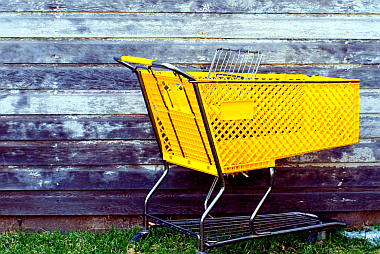Most of the environmental destruction we face in the world today has its roots in the choices that we make every day as consumers — whether global warming, the disappearance of rainforests and wetlands, groundwater contamination, or just the blight of discarded plastic bags and soda cans littering the side of the road. While it’s likely that the long-term solution to these and other environmental problems will require legislation, it’s important to keep in mind that legislation wouldn’t be as necessary if we as consumers didn’t buy, use, and throw out so much stuff. As Pogo noted so many years ago, “we have met the enemy and he is us”. With these problems looming so large, it can be hard to lose track of our own involvement — especially since information about manufacturing processes, corporate track records, and legislative action being either hard to find or, once found, hard to make sense of. Instead, we’ve seen a host of companies that have risen up to offer us “sustainable” or “eco-friendly” shopping options, which is fine but not really a solution. The answer is not so much to buy different stuff but to buy less stuff — and more than that, to think about why we buy the stuff we buy in the first place.
A Short History of Consumption
With the rise of the Industrial Revolution, the relationship between people and the goods that they made was broken. No longer did peasants plant, tend, and harvest their crops; now agricultural workers labored over someone else’s crops in exchange for wages. No longer did artisans design, plan, craft, and sell; now factory workers repeatedly carried out a single step in the production of a product, again in exchange for wages. In short, people were no longer producers. Ownership was vested in those with the money to back production — and those people didn’t do the actual work. Our identities were no longer tied up with the work we did, but with the buying power our work left us with. At the end of the day, workers were left not with the means to live but with a handful of wages to spend on the means to live. So people found their identities not in their work but in the things they could buy by working. People with better jobs could afford to buy better-quality (or even just sufficient) food, clothing, household goods, transportation, and so on. The idea of choice — in fashion, in lifestyle, in entertainments, even in sexual partners and habits — arose, as people began to build their identities not through their productive lives but through their lives as consumers, through their interactions with the market. People became consumers, not just in the way they got what they needed but in who they felt themselves to be.
Living Consumption
The rise of consumption as our primary interaction with the rest of our society has had profound effects. For example, social status is obtained and marked by the things we buy and use. A car, for instance, is not just a way to get from one place to another but has to “say something” about who we are — and even the lack of a car says volumes. Unlike the artisan who could express his or her identity through the things s/he created, we have learned to do so through the things we buy: the t-shirt with the logo of our band or team, the bamboo towels that show our environmental commitments, the alternative album that shows off our indie cred, the designer shoes that place us as part of the trend-setting elite, the minivan that shows us to be part of the dependable, hard-working, family-oriented suburban middle class, and so on. The problem with finding ourselves through consumption, though, is that consumption literally means using things up; the interaction with the market that defines us is momentary and fleeting, leaving us with things that will eventually be eaten, wear out, or go out of style. This means that we need to constantly acquire new goods to maintain our identities as consumers — goods which we consume and must again replenish. On top of that, advertisers understand and take advantage of this necessity by producing new needs (ten years ago, who knew or felt we needed a thousand songs in our pocket?) that demand to be met.
So What to Do?
For most of us, simply dropping out, growing our own food and living off our own labor, is not an option and is hardly desirable even if it were an option. The answer to the dreadful over-consumption that fills our landfills with completely unnecessary crap, pollutes our water sources, kills off species after species (something like 40 a day!), and leaves us in a world of ever-diminishing beauty and diversity can’t be to drop out of consumption entirely, because it’s simply not an option. But we can change the way we consume, and more importantly lessen the demands we place on consumption to complete us as individuals. This means developing a higher sense of self-reflexivity about what we do buy, and replacing our identities as consumers with identities as part of our families and communities — and maybe even as producers, once again. Here are a few ideas:
Ask Yourself: What do you really need? We grow accustomed to feeling our desires as “needs”, but rarely examine those needs. Do we need fast food every day, for example? A lot of people cite time concerns, but how much time are you really saving — and what else are you losing? Forget health concerns (though they’re important), what about the pleasures of family time and knowing your family is eating food you made them yourself, or just the joy of eating good food? Or, do we really need to own the latest best-seller; perhaps it can be enjoyed just as thoroughly if you checked it out of the library? Make something. Start a garden, and eat food you produced yourself. Or take up a craft — paint, or make jewelry, or knit, or make your own paper. Write. Find a way to express yourself through creating and not through consuming. (Of course, you’ll probably have to buy the materials for your new hobby — like I said, there’s no way off this ride, you just have to find ways to work within the system we’re given.) Join something, or if there’s nothing around worth joining, start something. Find ways to connect with other people who share your interests. Civic participation in the US and other Western countries has dropped sharply over the last few decades, leaving us with even more need to “complete” ourselves through consumption. Spend a few hours engaging with your community instead of shopping for new ways to be yourself. Pick a cause and make it your own. This follows from the last point — find ways of being part of your community that aren’t simply participating in the economy. If you can afford it, spend your money helping others instead of filling non-existent needs of your own, but even better, give your time, knowledge, and skills to those whose needs are real. Shop wisely. If you’re going to be forced to construct at least part of your identity through your role as a consumer, make sure that you are consuming thoughtfully. Ask how your values jibe with the product you’re buying. Choose sustainable products where available. I have a pair of scissors my grandmother bought in the 1930s — long-lasting, durable, high-quality products that are well-maintained can keep dozens of cheap ones from ever being produced — and that saves all the energy and raw materials that would go into their making as well as space in the landfills.
The Temple of Apollo at Delphi is reported to have had two sayings engraved at its entrance. The better-known is “Know thyself”; the other was “Nothing to excess”. Though I hardly think the temple’s builders had us and our current environmental dilemmas in mind, the advice is good for our current consumption-driven society. Know yourself — your needs, your wants, who you are and want to be –and match your consumption to those needs.

